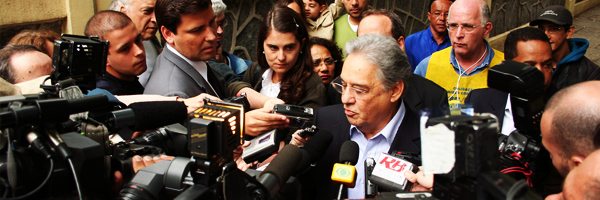Brazil isn’t the golden economy we thought it was
[dropcap]B[/dropcap]razil has made the most difficult political decision since its first direct election in 1989 after the country’s second dictatorship. The two largest Parties in Brazil – the Labour party and the Social Democratic Party – strived to convince the few unsure-voters left. As in many countries, this presidential dispute was polarised by a party with socialist mindsets against one with a neoliberal perspective.
Although it seems the two candidates, Dilma Roussef (Labour) and Aecio Neves (Social Democrats), had similar agendas regarding Education, Health and Security, nobody could deny that their social-economic projects determined the final result of the elections.
The victory for Dilma Roussef – fifty-one per cent – did not come easily, with forty-eight per cent of the voters choosing Aecio Neves at the ballots boxes. Although Roussef’s second term in office has not yet started, its consequences can already be seen, as thousands went to the streets asking for presidential impeachment. A smaller but influential group also asked for the return of the military dictatorship, which tortured hundreds of people in the 1970’s and is now under investigation for the crimes committed.
What is concerning, not only for Brazilians, but also for investors around the world are the financial outcomes for next year.
Roussef believes that the government should adopt the same stance as in 2003, when the Party won their first presidential election. The Labour Party wants to maintain high taxes, control inflation – which now is above 6,5 per cent and growing – and expand the investment in public sector. She claims that the government should keep control of the central bank since this is the only way to secure that inflation, wages, exchange rates, cap and the external economic agenda can be directly influenced by government measures.
The Labour Party needs now to deal with a staged growth that started during Roussefs’ term in office. She insinuates that the recent poor economic growth is caused by the still-ongoing world financial crisis. Although many economists rejected this argument, Roussef said that after normalisation in the international financial scenario her government would boost Brazil’s economy bolstering the internal markets. Regarding the external agenda the Labour candidate continues to prioritise the trade with Latin America, which is concerning since Argentina seems to be getting into deep financial problems and harm the Brazilian economy as well.
What is concerning, not only for Brazilians, but also for investors around the world are the financial outcomes for next year. For now, the largest petrol company in Brazil, Petrobras, is under federal and international investigation due to a scheme that embezzled more than one billion Reais (250 million pounds), which harmed the industry in about ten billion Reais (2.5 billion pounds). Some of its employees that are under the scope have claimed that the current government and other political parties have had participation on it. A Petrobras oil refinery in Pasadena, USA, is also under investigation for a similar scheme. This naturally affected the Brazilian stock market – Bovespa – and the company shares are plummeting.
Overall, the current economic landscape is not favourable for the country’s development. The value of the dollar-bound Brazilian currency, the Real, is dropping. This is making it hard for Brazilians to pursue new investments. The claims that the current government will change its economic policies for next year, as promised by Russef, are being contested. In addition, one of the most influential newspapers in the country, Folha de Sao Paulo, has stated that Anthony Garotinho, a politician convicted for corruption and still under police investigation, was sponsored by the government to be vice-president of the Banco do Brasil (Brazilian Bank), one of the largest state banks in the country.
Overall, the current economic landscape is not favourable for the country’s development.
The economist and writer Gerard Lyons recently stated that “Brazil is now in a recession and its main economic goal is to tackle short term issues. Poverty and corruption in the country need to be eradicated and improvements in infrastructure must be priorities”. In his view, this is the path Brazil needs to follow in order to develop economically in line with countries such as Germany and England.
Brazilians are still are unsatisfied with the promises for new social-economic policies, and feel neither of the candidates would be sufficient to fulfil the country’s needs. The country still has one of the highest corruption levels, the lowest literacy rate, and the most pessimistic citizens amongst the largest economies in the world. In other words, the current government is neither what the citizens want, nor what the country needs. Due to politicians’ dubious ethics and quality, it seems the country will regress into the times of military dictatorship: “Love it or leave it”.
[divider}
Photo: flickr / motti

Comments